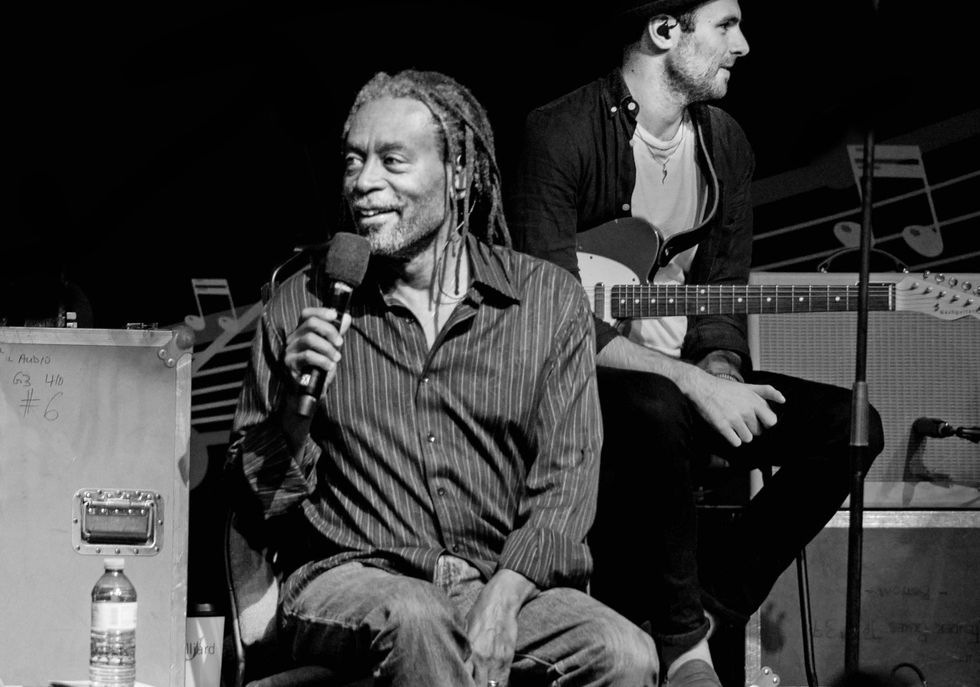A Conversation With....Bobby McFerrin
From deep in the archives comes this in-depth interview with the vocalist still best-known for the massive hit Don’t Worry, Be Happy who has gone on to win 10 Grammys.

By Bill King
While rummaging through well-worn Jazz Reports, a magazine I published for a good eighteen years beginning in 1987, I came across my interview with vocalist Bobby McFerrin from August 1988. What makes this so intriguing is the fact the issue coincides with the release of McFerrin’s triple-platinum best seller, Simple Pleasures, featuring the massive hit, Don’t Worry, Be Happy.
McFerrin’s career was on the upswing and he was most willing to sit for a conversation detailing his ambitions, vocalizing, and plans for the future. I’d been familiar with his recordings, especially his 1982 debut, Bobby McFerrin, on Electra Musician with a brilliant cover of Van Morrison’s Moondance, which I frequently played on Q-Jazz back in 1985. Here’s that conversation – and by the way – he has 10 Grammys now!
Bill King: Unlike other jazz vocalists who pay homage to the past by recording traditional standards, you have chosen to explore the songs of the ‘60s. Do you have a particular fascination with this era?
Bobby McFerrin: Not necessarily a fascination, but I do think the ‘60s were rich with distinguishable sounds, unlike the homogeneity of today. You never know who is doing what today. In the ‘60s you had all these distinctive voices like Janis Joplin, Jimi Hendrix, Cream, Led Zeppelin – great groups who wrote some exciting music. I’m a ‘60s child, and that was the music I listened to. Jazz was the last music I got into, and that was in the early ‘70s. I think I was more influenced by rock and classical music than anything else, so I thought that, on Simple Pleasures, I would tip my hat and pay homage to the good music of the ‘60s.
B.K: Some songs are deemed untouchable considering the strength of their original interpretation, but you were able to breathe new life into classics such as Van Morrison’s Moondance, Lennon and McCartney’s From Me to You, and Cream’s Sunshine of Your Love. How did you go about selecting material?
B.M: Those are the sorts of tunes I like, but even pieces that I think I like may lend themselves to immediate treatment while others may take a while to put together. I usually go for those that I have some relationship with right away. That doesn’t mean I don’t take time to work on other tunes. There was another Beatles song; She’s A Woman, that almost ended up on this record. It’s a great tune. I had put down the basic tracks, but I couldn’t figure out what else to do with it. There’s a lot of waiting involved in the recording process so, I waited for something to happen, and eventually, I found that I had waited too long. I kept coming back to She’s A Woman, but by that time, I figured I’d just save it.
B.K: Is there something in the components of a song, whether melodically or lyrically, that you look for in a tune like You Really Got a Hold on Me?
B.M: You Really Got a Hold on Me was not one of my favourite choices, although at first, I thought it would be a good idea to do. I was still a young and naïve musician at that point, and that was my first record. It was difficult for me to say no. I didn’t take any chances with it so it could have been a better arrangement. Now, I’m taking chances.
B.K: On your first LP Bobby McFerrin, on Electra Musician, you surround yourself with a band, but since then you’ve chosen to go it alone. Why have you decided to work solo?
B.M: Well, even when I was working with a band, I had already decided to go it alone, but I didn’t think that my first LP should be a solo album. It just wouldn’t have been a good idea. My manager, Linda Goldstein, probably wanted to wait and see. Another reason is that I had all of these songs that I had written a few years before, such as my arrangement of Moondance and Feline, and they needed to be put on vinyl. These were the tunes I wanted to record. It just made sense to do the first record with a band.
B.K: Do you get many opportunities to use your keyboard skills?
B.M: There’s a piece on the Elephant’s Child record, which I did with Jack Nicholson, where I played some keyboards. It depends on the piece whether I hear keyboards. I’m more into the vocal instrument, and I’m going to stick with that. I don’t see me working on or orchestrating other instruments in the foreseeable future
B.K: You paid your dues playing lounges and different jobs. Are you grateful to have those days behind you?
B.M: Yes. I don’t think I’d like doing that now, but I can now see it was all a process and indeed a valuable experience.
B.K: What was your stay in Salt Lake City like when you were based there?
B.M: It was wonderful. That’s where I started singing, playing piano bars and thinking about solo voice. I was also exposed to working with dancers, so a lot of good things came out of Salt Lake City. It’s a beautiful place to live, close to the mountains. It was a wonderful two years of musical germination, which made a lot of things clear.
B.K: You credit Keith Jarrett’s spontaneous solo concerts as being what inspired you to attempt performing as a solo artist.
B.M: Most definitely! I was intrigued by him because he dared to walk out on stage with no set idea, sit down at the piano, play and it would work. I wasn’t exposed to any other musicians who were doing that at the time. If you’re an arranger or a musician, generally you walk out with a set-in mind, sit down and play. And often, you’ve got your lights, you’ve got your smoke, you’ve got you’re dancing girls, you’ve got your lines or whatever.
For rock in the ‘60s, they didn’t do that too much. You rehearsed and knew what you were going to do, but then along comes somebody who just sits down at the piano and plays. It was new every time, and I was captivated by it all.
B.K: How do you prepare for a concert?
B.M: I eat fruits, I pace, I talk, I read letters, I have dinner, take walks, pet dogs..
B.K: Are there any particular exercises that you practice to maintain your vocal flexibility?
B.M: I don’t drink milk, and I vocalize.
B.K: You turn your body into a rhythm machine and your voice into a variety of instruments. How did you develop this technique?
B.M: Out of necessity. My body does not contain a lot of instruments. It contains sounds and colours. The technique came out of necessity. When I work on something, I must ask myself, “What are the elements? Intonation. Good intonation. I’ll focus on that and just work at it. I would like to have the best intonation in the world, but I can’t just stand out there and sing notes. So, what am I going to do with my body? Nobody is going to sit in the audience and watch a singer sing perfectly and creatively if he just stands there with his hands in his pockets. So, I started to move my body and it helped me as a singer. The audience needs to see the sound, so body movement is a way of taking a sound and putting in into a physical form. It’s giving them, the audience, something to see.
B.K: You’ve developed the ability to play rhythm patterns while improvising a horn solo. How do you bring all this together?
B.M: Drummers. Drummers fascinate me with all the things they do. Left and right feet; left and right hands and especially, drummers that sing. They can’t be thinking my left foot is doing this and my right is doing that. They can’t be thinking consciously about that. It’s impossible. You can’t divide your mind into four different activities at once.
B.K: Could you suggest a simple warm-up exercise for vocalists?
B.M: Sing tenths.
B.K: Do you have any favourite vocalist that you enjoy listening to?
B.M: Anita Baker, Stevie Wonder, Ray Charles, Steve Winwood, Joni Mitchell, Taj Mahal sometimes, and many others.
B.K: How do you view the music of the ‘80s?
B.M. There’s nothing distinguishable about most of the groups. You’d think that it would be the producer’s job to get the groups or musicians to be as unique as possible. The difference between the ‘60s and the ‘80s is that Janis would open her mouth, her musicians would be playing guitars plugged into amplifiers turned to 10, and they would wail. Now, you’ve got a guitar with 13 buttons, plugged into 12 more buttons on the floor, plugged into computers, plugged into a person backstage, plugged into 12 Marshalls speakers, plugged into a video screen.
There are only a few musicians I know who can handle that, creatively. Pat Metheny is one. I wouldn’t call him a rock musician. But he certainly has a rock undercurrent, along with jazz, classical and folk influences, yet he’s capable of synthesizing all these individual types of music into one voice. A lot of musicians don’t know who they are. Artists must take control of themselves. There are a lot of good vocalists out there, but many are drowned by technology.
B.K: Do you have any desire to record a pure jazz album?
B.M: I’ve thought about it, and one day I might go into the studio with a trio and do a straight-ahead jazz record, I’m not closed-minded enough to say, “No, I won’t do that,” but presently I have no such intentions.
B.K: You’ve won five Grammys, and you’re heard across North America each week on the Cosby Show and as the voice on the Levi jeans commercial. What else do you envision yourself exploring in the future?
B.M: Writing movie scores, television scores, an opera, putting a vocal group together and writing poems, along with staying home and singing in the bathtub.

















